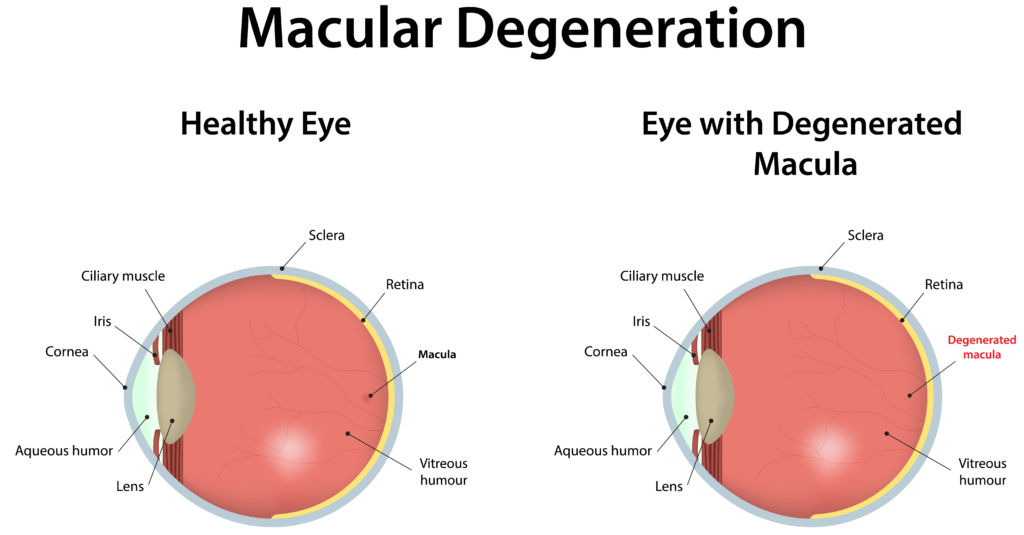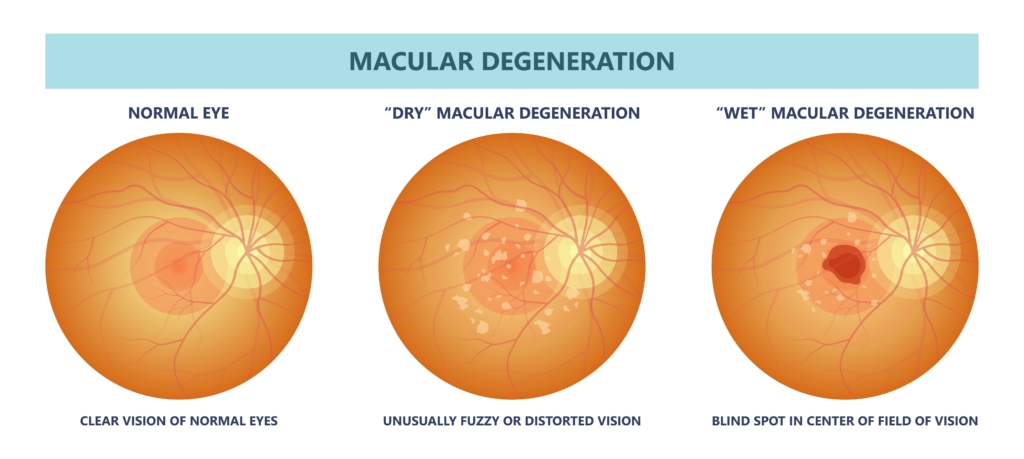What Do I Need to Know When it Comes to Macular Degeneration?
Macular degeneration or age-related macular degeneration (AMD) is the deterioration of the macula found at the center of your retina. The macula is responsible for your central vision, the fine details of everything you see, and your color vision.
Macular degeneration is one of the leading causes of vision loss in older adults over 55. Keep reading to learn more about macular degeneration and its effect on your vision!
What Causes Macular Degeneration?

AMD gradually damages your central vision. It occurs when the transportation of nutrients and waste by the retinal pigment epithelium (RPE) is slowed down.
As a result, yellowish deposits known as drusen form underneath your retina. Over time, a build-up of drusen deposits cuts off nutrients and oxygen to the macula. This results in the thinning of the macula and macular degeneration.
Risk Factors for Macular Degeneration

One of the things that can increase your risk of developing macular degeneration is aging. Other factors that contribute to your risk of having macular degeneration include:
- Family history of macular degeneration
- High blood pressure
- Heart disease
- Smoking and exposure to secondhand smoke
- High cholesterol levels
- Lack of exercise
- Being overweight
- Excessive exposure to the sun’s UV rays
- High saturated fat diet
Signs and Symptoms of Macular Degeneration
AMD might not have symptoms in the early stages until it advances or affects both eyes. Signs of macular degeneration include:
- Blurred vision
- Decreased night vision
- Needing more light for reading and other tasks
- Trouble seeing fine details in the middle of your vision
- Dark, blind spots in your central vision
- Having distorted vision where straight lines appear wavy
- Colors appear less vivid
- Disappearing words when reading
- Letters and numbers look jumbled
- Inability to judge distances properly, making it easier to fall and difficult to walk
Because there are so many potential symptoms of macular degeneration, it’s essential to be vigilant. If you suspect you could have macular degeneration, see your eye doctor.
Many symptoms of this eye condition also overlap with others, so it’s good to get them checked out to ensure you receive prompt treatment if necessary.
Types of Macular Degeneration

There are two kinds of macular degeneration: dry and wet. Dry AMD is more common than wet macular degeneration. About 85 to 90 percent of patients are diagnosed with dry macular degeneration.
Dry Macular Degeneration
Dry macular degeneration occurs when tissues in the macula begin to thin from age and when deposits from the thinning tissues accumulate on the macula. The formation of yellow spots around and on the macula is a sign of dry AMD.
Macula tissues are sensitive to light. As they continue thinning and degrading, you’ll experience increased sensitivity to light.
If left untreated, dry macular degeneration can worsen with time and cause loss of central vision.
Dry AMD happens in three stages as follows:
Early Dry Macular Degeneration
During early dry macular degeneration, there are small or few medium-sized drusen deposits during the early stage. At this point, there’s usually no sign of macular degeneration or vision loss.
Intermediate Dry Macular Degeneration
In the intermediate stage, there are a lot of medium-sized drusen or one or several large drusen. You may require more light for reading and other daily tasks.
Advanced Macular Degeneration
In the advanced and final stage of dry macular degeneration, patients experience severe loss of central vision in both eyes. A gray or black spot appears in the middle of your vision, affecting your ability to recognize faces, read, drive, and perform daily activities.
Wet Macular Degeneration
The other less common form of macular degeneration is wet macular degeneration. Dry macular degeneration can progress to wet AMD suddenly or during the early stage.
Wet macular degeneration can also develop on its own. While wet AMD is less common, it can lead to more severe vision loss. In wet macular degeneration, new blood vessels begin to grow abnormally underneath your retina.
These small and weak blood vessels leak out fluid and blood into the eye, causing scarring to your macula and permanent damage to your vision. Damage to your macula due to wet AMD may be irreversible if left untreated.
Gradual vision loss from wet macular degeneration typically includes a dark spot in your central vision followed by distortion.
Treatment Options for Macular Degeneration
Although there’s no cure for macular degeneration, there are treatments that can slow or stop vision loss. Some of the treatments and lifestyle changes include:
Treating Dry Macular Degeneration

If you’ve been diagnosed with dry AMD, your ophthalmologist will recommend you make lifestyle changes to slow vision loss.
- Quit smoking as it can exacerbate dry macular degeneration
- Maintain a healthy diet. Ensure your meals contain omega-3 fatty acids, whole grains, vegetables, and fruits to slow progressive vision loss
- Exercise regularly
- Take nutritional and dietary supplements
- Make sure your blood pressure is under control
- Wear high-quality sunglasses that offer protection against harmful UV rays
Treating Wet Macular Degeneration
There are various treatments for wet AMD that target the abnormal blood vessels growing in the retina.
- Anti-VEGF Injections – Anti-VEGF injections help stabilize and improve your vision by preventing abnormal blood vessels from developing.
- Photodynamic Therapy–Photodynamic therapy combines laser and drug treatment to seal leaking blood vessels.
- Laser Treatment – Laser treatment uses a beam of light directed at your retina to close leaking blood vessels.
Save Your Sight from Macular Degeneration

At Eye Consultants of North Dakota, we recommend that patients schedule regular eye exams to ensure early macular degeneration diagnosis. Early detection and treatment of AMD are critical to preventing your sight from worsening and protecting against vision loss.
Schedule your appointment at Eye Consultants of North Dakota in Fargo, ND, to keep your eyes healthy!



